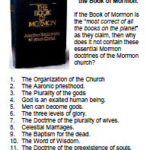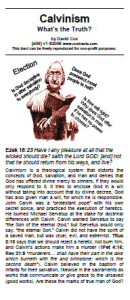Catholics and Punishment: We examine Catholic concepts of God’s punishment and purgatory.
Author Archives: Pastor David Cox
mor02 Contradictions and errors in the book of Mormon
Contradictions and Problems in the Book of Mormon
By David Cox
[mor02] v1r ©2005 www.coxtracts.com
This tract can be freely reproduced for non-profit use.
______________
12 Essential Mormon Doctrines not found in the Book of Mormon.
If the Book of Mormon is the “most correct of all the books on the planet” as they claim, then why does it not contain these essential Mormon doctrines of the Mormon church?
1. The Organization of the Church
2. The Aaronic priesthood.
3. The Plurality of the gods
4. God is an exalted human being.
5. Men can become gods.
6. The three levels of glory.
7. The Doctrine of the plurality of wives.
8. Celestial Marriages.
9. The Baptism for the dead.
10. The Word of Wisdom.
11. The Doctrine of the preexistence of souls.
12. Eternal progression.
doct16 Satan our Enemy
Satan, Our Enemy
By David Cox
[doct16] v1 ©2011 www.coxtracts.com
This can be freely reproduced for not profit use.
______________
1Pet 5:8 Be sober, be vigilant; because your adversary the devil, as a roaring lion, walketh about, seeking whom he may devour:
Satan is real, not fiction. He is our enemy, and does everything he can to defeat us in spiritual warfare.
How do we identify our enemy?
Matt 16:23 But he turned, and said unto Peter, Get thee behind me, Satan: thou art an offence unto me: for thou savourest not the things that be of God, but those that be of men.
The word “Satan” means adversary or enemy, and this is used by Jesus towards Peter when Jesus expressed his plans to die on the cross, and Peter opposed this purpose.
Num 22:22 And God’s anger was kindled because he went: and the angel of the LORD stood in the way for an adversary against him.
In this passage, the Angel of Jehovah is identified as “an adversary”. Obviously the Angel of Jehovah is not the devil, but in contrast many theologians identify this angel as the pre-incarnate Christ. So the basic concept of Satan is “the adversary,” or one who opposes another, which in its purest sense, is simply an enemy that confronts someone, whoever that may be. You might think that this concept as a “district attorney”, or an attorney with the task of assigning “blame” and opposing (Zec 3:1). The relationship of Satan as the accuser before God is clear, as in Job 1, but the reasons and the calling to this task are not as clear (if first from God, or after the fall was a voluntary thing by Satan). A very interesting passage in this respect is …
Isa 45:7 I form the light, and create darkness: I make peace, and create evil: I the LORD do all these things.
Notice that God sent adversaries to confront Solomon (1 Ki 11:14, 23, 25). God himself who commands the adversity to oppose (creates their existence, but this opposition is not in itself a sin). This is not to say that God is the author of sin, but He does send bad and difficult things in life to test and prove us. Do not think that God ordains these things just to see us suffer, but as any good trainer will do, he will order his soldiers through the most rigorous training to make them something of great value to the army. In this, although Satan’s motives are not pure in themselves, his activity serves God anyway. Satan is God’s adversary (and of the people who try to obey God’s will, purposes, and do the work of God). The devil IS OUR ADVERSARY (1Pet 5:8), and he walks about seeking whom he may devour, and so it is our duty to resist him. Satan wants our destruction, and not our welfare, and God permits Satan to war against us so as to make us more dependent upon God (the need of faith), and in the end, we will be pure gold (of great value).
The Wicked One
There are various Scriptures which refer to this person in the point of his character “the evil one” or “the wicked one” (Mat 13:19; Eph 6:16; 1Jn 2:13; 3:12). He is wicked. What is wickedness? This concept is simply that he wants to do damage to others in any form or way he can. It is the lack of piety, forgiveness, or mercy. Wickedness is also a disposition to constantly destroy and cause pain and suffering in others.
Arrogance
Isa 14:13 For thou hast said in thine heart, I will ascend into heaven, I will exalt my throne above the stars of God: I will sit also upon the mount of the congregation, in the sides of the north: 14 I will ascend above the heights of the clouds; I will be like the most High.
Satan is marked by his great confidence in his own self, to the point of being pure arrogance (Isa 14:11). This character quality is to have so much self-confidence, to confide in his own intelligence and understanding, that he despises the will of others, even despising God himself. This arrogance in making decisions and acting without seeking any direction from God is where Satan fell. It is his favorite sin. 1Tim 3:6 Not a novice, lest being lifted up with pride he fall into the condemnation of the devil. As Paul unfortunately reveals here, this satanic character is an element that causes (or should cause) an immediate rejection from the ministry if found in a minister.
The Lie, Deception, and Deceit
John 8:44 Ye are of your father the devil, and the lusts of your father ye will do. He was a murderer from the beginning, and abode not in the truth, because there is no truth in him. When he speaketh a lie, he speaketh of his own: for he is a liar, and the father of it. “From the beginning” Satan was always a deceiver. Everything that he pretends to offer or declare is a deception in some form. He nevers presents the full truth, but twists it in some aspect or small part so as to nullify its benefit.
2Cor 11:13 For such [are] false apostles, deceitful workers, transforming themselves into the apostles of Christ. 14 And no marvel; for Satan himself is transformed into an angel of light. 15 Therefore [it is] no great thing if his ministers also be transformed as the ministers of righteousness; whose end shall be according to their works.
Satan has a distinct form of working, and this is the lie. He is “the father of the lie”, and this is where the lie was born, and from which all lies come. Satan’s manner of working is to always present himself and his work in some other form than what it really is. He fabricates another “reality” that is not real. Lies, deceit, distortion are the telltale marks of his work. Eph 4:14 That we henceforth be no more children, tossed to and fro, and carried about with every wind of doctrine, by the sleight of men, and cunning craftiness, whereby they lie in wait to deceive;
The Use of Miracles
2Thess 2:9 Even him, whose coming is after the working of Satan with all power and signs and lying wonders, 10 And with all deceivableness of unrighteousness in them that perish; because they received not the love of the truth, that they might be saved. Satan has a very strong power in our world, and even God refers to his station (given before the fall) as “the god of this world” (2Cor 4:4; Jn 12:31). Satan well knows that the very fact of having supernatural power does not speak as to where the source of that power lies, but so many people are so easily deceived by the fact of a miracle, that Satan puts this lie to good use for his purposes.
The Tempter, the Accuser
Rev 12:10… for the accuser of our brethren is cast down, which accused them before our God day and night. Satan is a condemned criminal in the eyes of God, and he has been destined to judgment, but Satan doesn’t want to go down peacefully.
Satan wants to drag everyone with him into hell that he can so his character is based in tempting and tripping up everybody anyway he can (1Chr 21:1; Luk 22:31). Moreover, he not only wants others to fall, Satan himself is who will be accusing us before God, so that God condemns us just as He will judge Satan. In Job 1:6-12, Satan accuses Job before God Zec 3:1-2; Rev 12:10.
Satanic Aggression
Rev 12:12 Therefore rejoice, [ye] heavens, and ye that dwell in them. Woe to the inhabiters of the earth and of the sea! for the devil is come down unto you, having great wrath, because he knoweth that he hath but a short time.
Satan knows what will be his end, and even so, he still presses forward with his failed plan, and he is in a hurry because his time is short. In his hurry, he resorts to much aggression against humanity so that they trip and fall as quickly and deeply as possible. The Bible tells us Satan is very cruel and brutal in this fight. One thing you will never find Satan really doing is having compassion or mercy because that belongs to the character of God, not Satan. He never pardons, only cruelly pressuring. He is a very dangerous enemy.
The Murderer
John 8:44 Ye are of your father the devil, and the lusts of your father ye will do. He was a murderer from the beginning, and abode not in the truth, because there is no truth in him. When he speaketh a lie, he speaketh of his own: for he is a liar, and the father of it.
In what sense are lies and murder connected? A murderer is someone who completely has no respect of others, and hates somebody so much that he will steal, and even steal that person’s life. Murder is simply an extreme form of aggression. Hurting others, lying to them, and any other forms of harm are simply minor forms of the same aggressive spirit that is behind murder. The hatred here is that one person dislikes another so much that he will not tell the truth (which has blessing attached to it) but rather wants others to hear and believe lies (which has condemnation associated with it). Satan’s greatest work is to remove the love of truth from men so that they are not saved (2Th 2:9-10).
Our Disposition towards Satan
Jude 1:9 Yet Michael the archangel, when contending with the devil he disputed about the body of Moses, durst not bring against him a railing accusation, but said, The Lord rebuke thee.
In October with Halloween, as well as with Hollywood culture, they paint Satan in a red jump suit with horns and a tail, so as to minimize him as a real threat. We should note that God originally gave him great power and authority (“the god of this world” 2Cor 4:4), and he is a prince. Isa 14:9 Hell from beneath is moved for thee to meet thee at thy coming”. So he is a dangerous opponent not to be underestimated or taken lightly, and even the archangel Michael knows his ability (Jude 1:9). He is a very powerful enemy, but God is greater.
Satan’s Limits
Job 1:12 And the LORD said unto Satan, Behold, all that he hath is in thy power; only upon himself put not forth thine hand. So Satan went forth from the presence of the LORD.
Satan is not equal in power with God. He is a creature of God, and dependent upon God for his existence, just as we are. He is limited to what God permits him to do. Satan can only act to the limits which God allows him, and every child of God should always remember this.
Matt 8:31 So the devils besought him, saying, If thou cast us out, suffer us to go away into the herd of swine.
Satan and his demons are restricted by God’s being and power. Yes he allows them to act for now, but judgment day is coming, and God will not allow them to go beyond certain limits (Jn 19:11; Mt 12:28).
calv01 Calvinism What’s the Truth?
Calvinism What’s the Truth?
What’s wrong with Calvinism?
by David Cox
[calv01] v1 ©2006 www.coxtracts.com
This tract can be freely reproduced for non-profit purposes.
Ezek 18:23 Have I any pleasure at all that the wicked should die? saith the Lord GOD: [and] not that he should return from his ways, and live?
Calvinism is a theological system that distorts the concepts of God, salvation, and man and denies that God has offered divine mercy to sinners, if they would only respond to it. It tries to enclose God in a will without taking into account that by divine decree, God has also given man a will, for which he is responsible. John Calvin was a “protestant pope” with his own secret police, and practiced the execution of heretics. He burned Michael Servetus at the stake for doctrinal differences with Calvin. Calvin wanted Servetus to say “the Son of the eternal God,“ but Servetus would only say, “the eternal Son.” Calvin did not have the spirit of a saved man, but was cruel, evil, and extremist. Titus 3:10 says that we should reject a heretic, not burn him, and Calvin’s actions make him a murder (1Pet 4:15; Rev 21:8 “murderers… shall have their part in the lake which burneth with fire and brimstone: which is the second death”). Calvin believed in the baptism of infants for their salvation, likewise in the sacraments as works that communicate or give grace to the unsaved (good works). Are these the marks of true man of God? Continue reading
cat16 Purgatory Is Not Biblical
cat16 Purgatory Is Not Biblical explains why the Catholic fabrication of purgatory is not biblical, and what the Bible says will happen to the believer at death.
ch43 Time to leave your church?
When is it time to leave your church?
By David Cox
[ch43] v1 ©2011 www.coxtracts.com
You may freely reproduce this tract for non-profit purposes
Phil 2:2 Fulfil ye my joy, that ye be likeminded, having the same love, [being] of one accord, of one mind.
Every good Christian will have a serious relationship with a group of brethren (a local church) of the same faith and practice that you have, and if you have incorporated yourself into their activities and fellowship, leaving will be difficult, and it should be. Your reasons for leaving should be taken because of definite events, attitudes, practices, or doctrines in that church that make you feel that you are “not the same as they are”, that they do not have the same love of Christ as you, because they do not follow Christ according to Scripture (in teachings, doctrine, practices, attitudes, etc), there is a rupture between you that forces your physical separation from that group. You should first try to examine your own spirit, to see if you are wrong, then talk with leaders in the church group to try and resolve the problem. After prayer, no resolution, you need to go to the pastor or leaders and tell them you are troubled, and will seek another church. Continue reading
bs54 Why do Arabs hate Jews?
bs54 Why do Arabs hate Jews? We explain this hatred in light of Satan hatred toward God and God’s chosen people.
Why do Arabs hate Jews?
by David Cox
[bs54] v1 ©2023 www.coxtracts.com
You may freely reproduce this for non-profit purposes
The Spiritual Battle
Genesis 1:27 So God created man in his own image, in the image of God created he him; male and female created he them.
From creation, God has made the creature called “man” his favorite of all the creation of God. The reasoning behind this is because God made man “in His image.” One of the first events after His creation was the spiritual attack that Satan made against mankind by means of Eve. Sin entered the world, and with sin, death.
Men began to multiply, and from the sons of Adam and Eve, there was a spiritual distinction between men. Abel pleased God in how he worshipped Him, and Cain did not. Genesis 4:5 But unto Cain and to his offering he had not respect. And Cain was very wroth, and his countenance fell. 1 John 3:12 Not as Cain, who was of that wicked one, and slew his brother. And wherefore slew he him? Because his own works were evil, and his brother’s righteous.
Cain was proud, and he could not put up with the fact that the offering of his brother was accepted, but his was not. Satan always confuses people to ignore the simple solution. The simple solution was for Cain to change, and for him to offer another sacrifice in the proper way, using one of his animals with its blood.
bs29 The Golden Rule
bs29 The Golden Rule explains this golden principle of treating others as you would have people to treat you.
bs29] v1 © 2014 www.coxtracts.com
This brochure can be freely photocopied and printed.
Matt 7:12 Therefore all things whatsoever ye would that men should do to you, do ye even so to them: for this is the law and the prophets.
Our relationships with other people are a serious problem in almost everyone’s life. We have quarrels and contentions and bad relationships with others, and this is the “very fabric” of life. The problem with all of this is that God sees the reality of your faith through the changes made in you, and these changes are more important in terms of your relationships with others in this life, especially with your brethren in Christ. Furthermore, God’s purpose for us is to minister to God, to be a blessing to others. That is why salvation is a moral change, a real change. Because of this, we must be proactive in doing good to others, not reacting to how they treat us. Read the context: Luke 6: 27-36
pc61 Resisting Peer Pressure, Christian Cowards
pc61 Resisting Peer Pressure, Christian Cowards. We analyze the pressure of unsaved friends on the Christian.
By David Cox
[pc61] v1 ©2019 www.coxtracts.com
You may freely reproduce this tract for non-profit purposes.
Exodus 23:2 Thou shalt not follow a multitude to do evil; neither shalt thou speak in a cause to decline after many to wrest judgment.
Many Christians seem defenseless when there is a lot of pressure from their friends or acquaintances to get them to “go along” with incorrect things, or in what doesn’t please God.
To be a Christian, the person absolutely has to have moral strength and courage to stand against the world and even against his friends at times, to declare what God says in the Bible as this is what we have to do, and definitely declare that the Bible way is what the Christian will do, even if there is a lot of pressure from others to do incorrect things. Pleasing God overrules pleasing friends.
SST3-02 Keeping your Soul Visual Door to the Mind
Keeping your Soul Visual Door to the Mind
By David Cox © 2012
Sunday School Series 3, Number 2
https://www.coxtracts.com/free-teen-sunday-school-classes/
In this Sunday School class, we examine what the Bible has to say about letting evil things into our mind and soul by the visual eye gate. When we set evil before us on a constant basis, it can do nothing good to us, and it will eventually wear down the strongest of Christians into accepting these sins.








